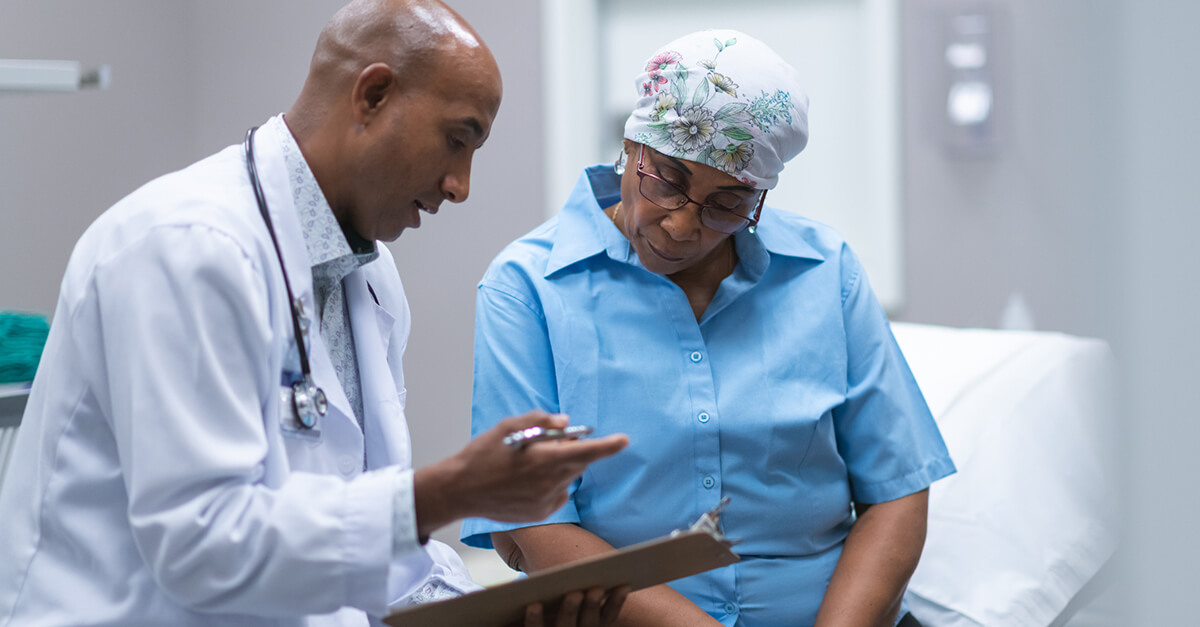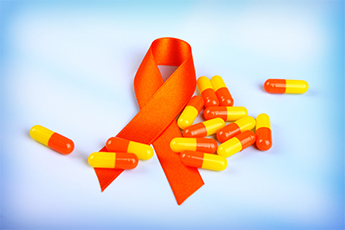Kidney cancer survival rates

Over the past couple of decades, the number of people diagnosed with kidney cancer has steadily increased by about 1% each year. This year, more than 76,000 Americans will receive a kidney cancer diagnosis.
Facts about kidney cancer
Imaging tests like CT scans are helping to detect kidney cancer early, when treatments are more successful at stopping the cancer from spreading (metastasizing). Still, kidney cancer continues to claim the lives of close to 14,000 Americans annually.
Between 2009 and 2018, there was a steady 1% drop in kidney cancer deaths each year. Advancements in disease detection and treatments are helping to improve the prognosis and outlook for many people with kidney cancer.
How does kidney cancer stage affect prognosis?
Your odds of cancer survivorship are better when you catch the disease early before it spreads. Doctors use the tumor, node, metastasis (TNM) staging system to stage kidney cancer. Staging happens at the initial diagnosis and whenever cancer returns after treatment.
Kidney cancer that only affects a kidney (localized) responds well to treatments. Cancer that spreads to nearby lymph nodes (regional) or to other organs (distant or metastatic kidney cancer) is more difficult to treat. For this reason, the survival rates are lower.
To determine cancer stage, your doctor assesses:
tumor size and growth
number of affected lymph nodes
metastasis (cancer spread to bones or organs)
What are kidney cancer survival rates?
Kidney cancer is a highly treatable cancer when diagnosed early. The five-year relative survival rate is more than 75%. This means that as many as 3 in 4 people with kidney cancer are still alive five years after receiving their initial diagnosis. Another way of putting it is that you’re as likely to still be around five years after the diagnosis as those who don’t have kidney cancer.
The five-year relative survival rates for those who have stage 1 (localized) kidney cancer are the highest. More than 9 in 10 people are alive five years after the diagnosis. Two-thirds of kidney cancers are localized.
The prognosis drops as the cancer spreads:
Regional kidney cancer: About 16% of kidney cancers are regional, which means the cancer affects nearby lymph nodes. About 7 in 10 people with regional kidney cancer are alive five years after the diagnosis.
Metastatic kidney cancer: Cancer that spreads to distant parts of the body like the brain, lungs, or bones accounts for 16% of kidney cancers. Approximately 1 in 14 people with metastatic kidney cancer are still alive five years after the diagnosis.
From the community: “My husband was 51 at diagnosis, though it was stage 1 at that time, metastasized to stage 4 3-1/2 years later. We've just passed 10 years, danced at the wedding of all three kids and have our first grandchild and another on the way. I won't say it's been easy, but we've had way more good days than bad. Things have changed dramatically in recent years in the treatment options for RCC.” – Inspire member
What factors affect kidney cancer survival rates?
It’s important to keep in mind that five-year survival rates are estimates. Your health situation and individual prognosis are unique. These factors also play a role:
age
blood cell counts, including red and white blood cells and platelets
cancer stage
cancer type, such as renal cell carcinoma
disease response to cancer treatments
overall health
performance status (how well you can manage daily activities)
red blood cell count
Steps to improve kidney cancer prognosis
These steps can lower the chances of a kidney cancer recurrence and may add years to your life:
Eat a kidney-friendly diet: Because certain foods high in minerals and vitamins can make the kidneys work harder, a kidney-friendly diet should be low in sodium, phosphorous, and potassium. You may also need to cut back on high-protein foods.
Follow a cancer survivorship care plan: Your doctor or cancer center can provide a cancer survivorship care plan to help you monitor your health. This plan ensures you don’t miss important follow-up tests and educates you about signs of disease recurrence.
Get help to quit smoking: Smoking increases the risk of renal cell carcinoma. It’s possible that continuing to smoke may increase the risk of cancer metastasis or recurrence. After kidney surgery (nephrectomy), smoking makes you more prone to blood clots, heart attacks, pneumonia, and strokes.
Maintain a healthy weight: Obesity is known to cause inflammation throughout the body and may spur the growth of cancer cells. Excess weight can also cause high blood pressure, which strains the kidneys.
Participate in a clinical trial: People with aggressive kidney cancers may benefit from volunteering for a clinical trial. A clinical trial allows you to try new drug therapies still in development. This can be especially helpful when other treatments don’t help. Your doctor can determine if there’s a clinical trial that’s right for you.
From the community: “I am a 22 year kidney cancer survivor, having been diagnosed as Stage 4 some 17 years ago. I continue to be treated for metastatic renal cell cancer spread to my pancreas and remaining kidney. Currently I feel totally healthy as I experience virtually no side-effects from almost a year of treatment with monthly infusions of Opdivo. I have a hard time maintaining my weight, but I rarely mention this because, as you might imagine, there is less than no sympathy for such an effect.
I used this forum a lot back when my prognosis was an average 18 months survival. There was only Interluken 2 to treat kidney cancer then and it only worked in 1 in 10 cases. I chose to try the high dose treatment version involving 2 cycles of ICU care in a hospital with mounting side-effects, the details of which are better left to the imagination. It did not work. But by then clinical trials were underway with new formulations of therapy. I … participate(d) in a trial of Avastin and Tarceva and was one of the 5 top responders in our small trial of 75 people. When that stopped working, I went on to Sutent and later Votrient. After they stopped working I went into a trial at Dana Farber Cancer Institute... for a new drug known only as XL-187, eventually Cabozantinib. It worked for a while but made me really ill, and so I was switched to the drug being compared, Everolimus, and did quite well on that one for another year or so… Then I went on Opdivo, first every 2 weeks, and now every 4 weeks. The infusion takes 30 minutes and I don't experience any sides. I rely on my faith in my survival when I wonder about what will happen when it (as they all eventually do) stops working too. I guess my bedrock position is that I will figure out how to stay alive until the cure is found. Until then, I couldn't ask for a better quality of life than I am experiencing today. I will say I am often blindsided by issues related to aging, as I never dared anticipate getting to be old.” – Inspire member
Sources
Does body weight affect cancer risk? American Cancer Society. June 2020.
Risk factors for kidney cancer. American Cancer Society. February 2020.
Survival rates for kidney cancer. American Cancer Society. January 2021.
What’s new in kidney research? American Cancer Society. February 2020.
Kidney cancer: Statistics. American Society of Clinical Oncology. January 2021.
Cancer survivorship care plans. Centers for Disease Control and Prevention. May 2021.
Cancer stat facts: Kidney and renal pelvis cancer. National Cancer Institute.
Disclaimer
Member comments are lightly edited for length and to remove identifying information but are otherwise reproduced as they appear in the community as part of public posts.
This content is for general informational purposes only and does not necessarily reflect the views and opinions of any organization or individual. The content should not be used as a substitute for professional medical advice, diagnosis, or treatment. Please consult your healthcare provider about any questions you may have regarding a medical condition.




